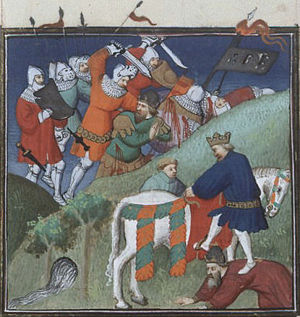INTERNAL CRISIS AND EXTERNAL DANGERS
(1054-1081)
a. Political instability and economic problems.
A long period of political instability followed the death of Vasilios the Second. During this period that lasted over a century the emperors came either from the political party or the military aristocracy, since each side was pushing through its own representative. Even the church played a dynamic role to the political developments especially when patriarch was the ambitious Michael Kiroularios. This political instability had severe consequences to the state’s economy:
- During the midst 11th century the state used to lease the taxes.
- Buying off offices was a common practice.
- The money for the army was cut off.
- The donations towards the Court, the church and the foreign countries were increased.
The result was that the state’s economy was led to bankruptcy.
b. External problems. The battle of Manzikert.
 Economy
was not the only problem for the Byzantine state. It also
faced problems in the defense of Italy, the Balkan areas and
especially of the East. The problem was more serious in the
East since the Seljuk Turks moved around the year 1000
towards the West and very quickly they took over the last
Arabic areas profiting by the dissolution of the Arabic
state.
Economy
was not the only problem for the Byzantine state. It also
faced problems in the defense of Italy, the Balkan areas and
especially of the East. The problem was more serious in the
East since the Seljuk Turks moved around the year 1000
towards the West and very quickly they took over the last
Arabic areas profiting by the dissolution of the Arabic
state.
The emperor Romanos Diogenes tried to stop the destructive invasions of the Turks in the Eastern provinces. The decisive battle was taken place in Manzikert in 1071. The Byzantine army was destroyed and the emperor was taken captive. The Turks accepted the emperor’s peace offer and released him. Unfortunately the emperor was murdered by his political opponents when he returned to Constantinople. After his death the Turks cancelled the treaty and within a decade they managed to conquer the biggest part of Asia Minor.
Το Μαλαζγκίρτ (τουρκικά: Malazgirt, παλαιότερα Μαντζικέρτ, Manzikert) είναι μια μικρή πόλη της Ανατολικής Τουρκίας (πρώην Αρμενίας), πλησίον της λίμνης Βαν.
Έχει πληθυσμό 24.000 κατοίκων. Είναι γνωστή από τη Μάχη του Μαντζικέρτ, τον Αύγουστο του 1071 μΧ, κατά την οποία ο ανομοιογενής (κατά βάση μισθοφορικός) στρατός των Βυζαντινών, μετά από την προδοτική στάση των Δουκών και των φίλων τους, σε στρατιωτικό και πολιτικό επίπεδο (Ιωάννης Δούκας, Ανδρόνικος Δούκας, Μιχαήλ Ψελλός, κτλ), νικήθηκαν αποφασιστικά από τους Σελτζούκους Τούρκους. Ο ίδιος ο Βυζαντινός Αυτοκράτορας Ρωμανός Δ' Διογένης μαζί με πολλούς στρατηγούς πιάστηκαν αιχμάλωτοι. Ακολούθησε ταπεινωτική συμφωνία με το Σουλτάνο Άλπ Ασλάν για τη δημιουργία Τουρκικού κράτους buffer κατά των επιδρομών, απελευθέρωση του Ρωμανού και επιστροφή του στην Κωνσταντινούπολη όπου τυφλώθηκε και εξορίστηκε από το νέο αυτοκράτορα Μιχαήλ Δούκα στη νήσο Πρώτη της Προποντίδας, στην οποία πέθανε το 1072 μΧ, από τα τραύματά του. Η μάχη αυτή σήμανε την ίδρυση του Σουλτανάτου του Ικονίου, την οριστική εγκατάσταση των Τούρκων στην περιοχή της Ανατολίας και την απαρχή της πτώσης του Βυζαντίου.
c. Other problems
The last Italian areas belonging to the Byzantines were conquered by the leader of the Normans Rovertos Yiskardos and the Byzantine domination in Adriatic and the Danube was not so stable.
The state was also facing a bloody riot against the officers responsible for the economic policy, since the prices of the goods and especially of the bread became astronomical. An end was given to the political crisis by the enthronement of Alexios First Comnenos representative of the military aristocracy of Asia Minor.
THE INTERNAL POLICY OF COMNENI
a. Administration and economy
During the kingdom of Alexios the First Comnenos:
1. The number of offices was increased.
2. The bureaucracy became less centralized
3. The number of θέματα was increased so they became smaller and less
important.
4. The emperor exploited the continuous devaluation of the currency and he
actually increased the taxes. Even though the amount remained the same the
people had to give more money in order to pay the taxes.
5. The tax payers had to work obligatory with no payment in public works:
roads, bridges etc.
6. The greediness of the civilians that collected the taxes made the
economic situation of the people and especially of the farmers worse.
b. The army and the institution of πρόνοια
The Byzantine army uses not only mercenaries but mainly προνοιάριους . The
emperor allotted pieces of land or the right to collect the taxes to the
military in exchange of military service. These allowances were called
πρόνοιες , they were property of the state and the προνοιάριοι could’nt sell
them or inherit them. These soldiers were equestrians and participated in
the war in charge of a group of soldiers whose number depended on the size
of the πρόνοια given. This institution resembles the one of feudalism but it
is not the same. During this period the army became the dominating class in
the Byzantine state and lived off the wretched population, thus many people
choose to join the army.
c. Effort for changes
The emperor Andronikos First was the only one of the Comneni dynasty that
was interested in the farmers. He tried to protect the peasants from the
abuses of the strong. He even tried to fight the corruption of the
administration. He used however so much violence that his kingdom was turned
into tyranny. The people turned against him so his program failed. During
his kingdom the relations with the West became worse and the states of
Western Europe turned against the Byzantine state.
Bibliography
1. Alfred Friendly “The Dreadful Day, the Battle of Manzikert 1071”,
University Press of Virginia, 1982.
2. Toumanoff, C. “The Background to Mantzikert”, International Congress of
Byzantine Studies, London, 1967.
3. Νίκος Τσάγγας “Μαντζικέρτ, Η Αρχή του Τέλους
του Μεσαιωνικού Ελληνισμού”, Εκδόσεις Γκοβόστη.